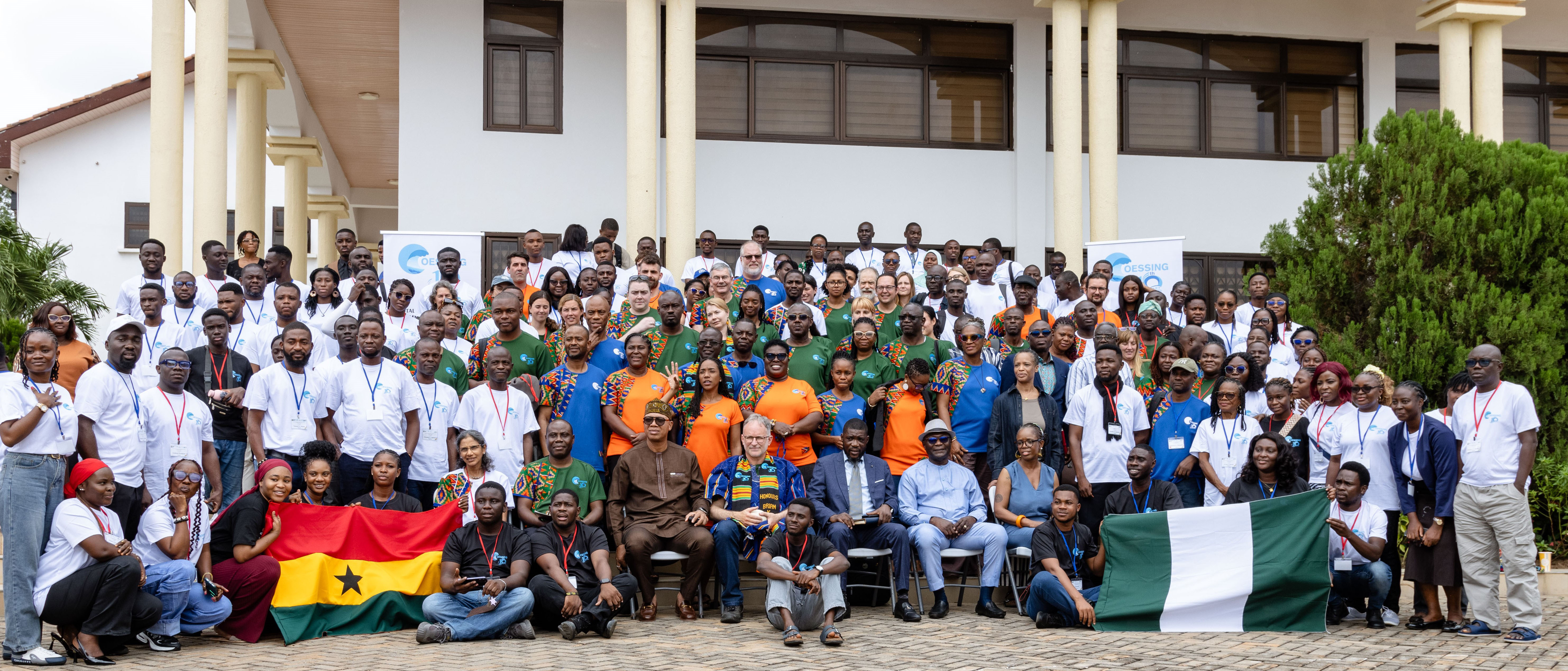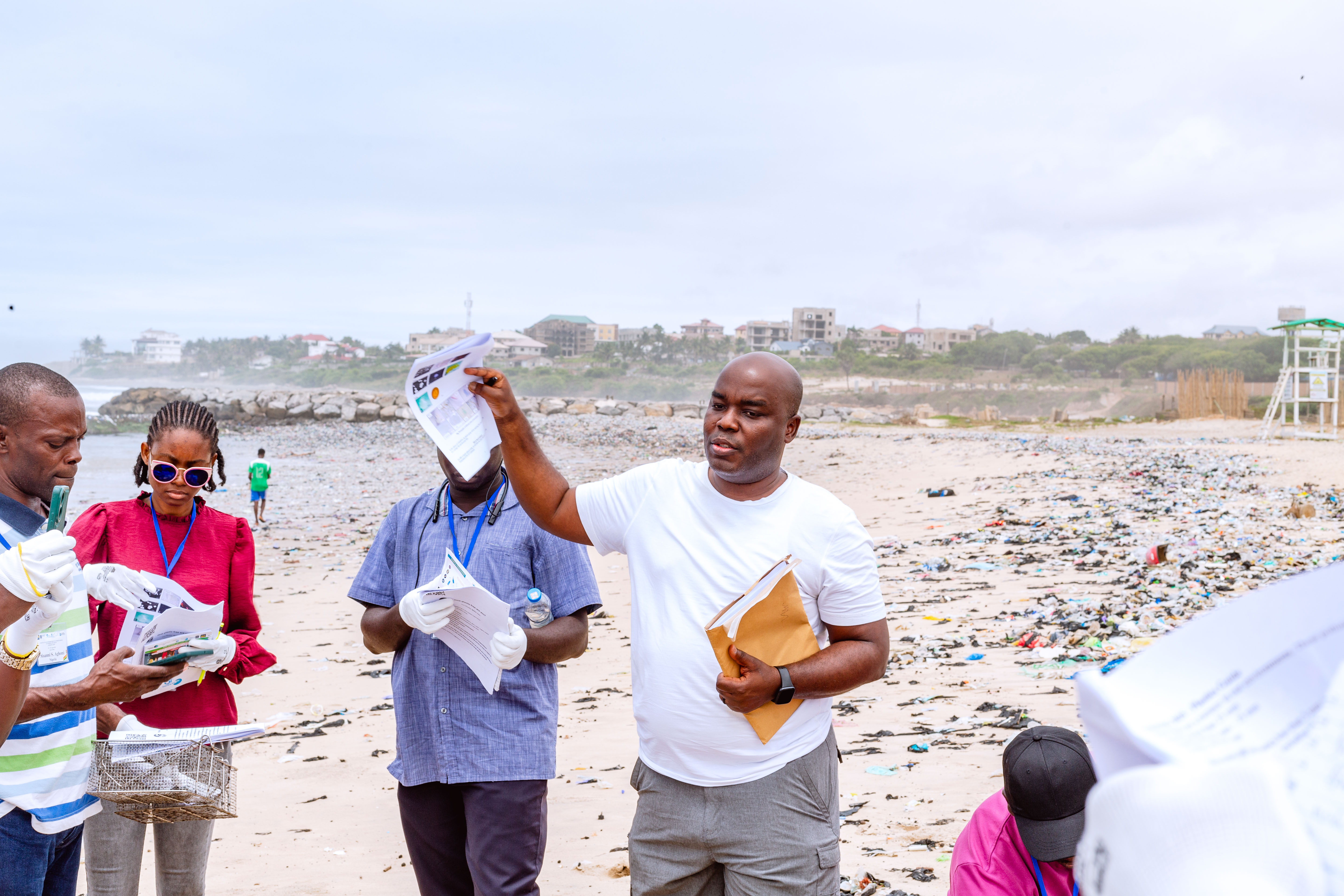NGI Scientist Participates in a Decade of Summer School, Capacity Development, and Collaboration in Africa
September 10, 2025

A group photograph of invited guests, leaders, and participants during the opening ceremony of the 2025 Coastal Ocean Environment Summer School in Nigeria and Ghana, West Africa.
This year marked the 10th edition of the Coastal Ocean Environment Summer School in Nigeria and Ghana (COESSING), a program that has trained nearly 1,000 scientists, students, and professionals from Africa, the United States, and Europe. Dr. Ebenezer (Eben) Nyadjro, an associate research professor with Mississippi State University at the Northern Gulf Institute (NGI), spent part of his summer in Ghana, West Africa, where he continued his long-standing commitment to ocean science education and capacity development in the region. Remarkably, Dr. Nyadjro is one of only four people—including COESSING founder Dr. Brian Arbic, a professor at the University of Michigan—to have participated in every edition since the school's inception in 2015.
The ocean plays a vital role in the lives and economies of coastal West African nations, supplying food, livelihoods, and wealth through fishing, tourism, and oil and gas activities. Yet, these benefits come with major challenges, including coastal erosion, flooding, pollution, habitat loss, and illegal fishing. Many of these issues begin locally but extend far beyond the shoreline, making regional collaboration and strong science essential.
Despite this urgency, many developing countries lack the expertise, tools, and data needed to guide effective, evidence-based decision-making. Recognizing these gaps, the United Nations Decade of Ocean Science for Sustainable Development (2021–2030) calls for greater sharing of skills, technology, and knowledge worldwide. Programs like COESSING directly address this challenge through project-based learning (PBL)—immersive training that builds both technical expertise and professional networks for the next generation of ocean scientists.

Dr. Ebenezer (Eben) Nyadjro (center) leads COESSING participants during a hands-on field session to collect and document plastic pollution on the Mighty Beach, Sakumono, Ghana.
At COESSING 2025 , Dr. Nyadjro delivered lectures, led hands-on field and laboratory sessions, and guided project teams. Participants included undergraduate and graduate students, faculty, government officials, NGO representatives, and private sector professionals from across West Africa—all with a shared goal to strengthen the region's capacity in ocean and coastal science.
While in Ghana, Dr. Nyadjro also organized the 5th Annual International Workshop of the U.S.-Africa Coastal Resilience Research Consortium (CRRC). This event featured plenary sessions, keynote addresses, technical talks, and a dedicated early-career researcher training day. Discussions centered on the urgent pressures facing Africa's coastal zones from climate change, over-exploitation, and pollution, while also emphasizing opportunities within the Blue Economy framework. A strong consensus emerged: Building resilient coasts will require a combination of robust science, expansive data, technological innovation, inclusive policy, and active community engagement.
In addition, Dr. Nyadjro visited the Ghana Atomic Energy Commission (GAEC), where he met with officials to discuss their ongoing microplastics research and ways they could contribute to and share data with the National Oceanic and Atmospheric Administration's (NOAA) National Centers of Environmental Information's (
NCEI) Global Microplastics Database, which he helps manage.
COESSING receives support from the University of Michigan, the U.S. Office of Naval Research, the National Science Foundation, and the Schmidt Family Foundation, among others. Over the years, Dr. Nyadjro's involvement with the school has not only produced multiple peer-reviewed publications on topics such as ocean salinity dynamics, satellite oceanography, ocean modeling, and capacity development but also highlighted the important role of NGI and NCEI in providing curated, accessible oceanographic data for research and environmental monitoring.
From a decade of COESSING summer schools to new collaborations with GAEC and leadership of the CRRC workshop, Dr. Nyadjro's efforts underscore NGI's commitment to advancing scientific collaboration, capacity development, and resilience in coastal and marine environments.
************
The
Coastal Ocean Environment Summer School in Nigeria and Ghana is an international collaboration aimed at advancing ocean science in West Africa and furthering ties between scientists in West Africa and elsewhere around the globe.
The
National Centers for Environmental Information is the nation's leading authority for environmental data, managing one of the largest archives of atmospheric, coastal, geophysical, and oceanic research and providing products and services that enable better discovery and use of these data.
The
Northern Gulf Institute is a NOAA Cooperative Institute with six academic institutions located across the U.S. Gulf Coast states, conducting research and outreach on the interconnections among Gulf of America ecosystems for informed decision making.
By
Dr. Ebenezer (Eben) Nyadjro and
Nilde Maggie Dannreuther with the Northern Gulf Institute at Mississippi State University.

